- Home
- H. P. Lovecraft
Eldritch Tales Page 6
Eldritch Tales Read online
Page 6
I had somehow taken it for granted that the house was abandoned, yet as I approached it I was not so sure; for though the walks were indeed overgrown with weeds, they seemed to retain their nature a little too well to argue complete desertion. Therefore instead of trying the door I knocked, feeling as I did so a trepidation I could scarcely explain. As I waited on the rough, mossy rock which served as a doorstep, I glanced at the neighbouring windows and the panes of the transom above me, and noticed that although old, rattling, and almost opaque with dirt, they were not broken. The building, then, must still be inhabited, despite its isolation and general neglect. However, my rapping evoked no response, so after repeating the summons I tried the rusty latch and found the door unfastened. Inside was a little vestibule with walls from which the plaster was falling, and through the doorway came a faint but peculiarly hateful odour. I entered, carrying my bicycle, and closed the door behind me. Ahead rose a narrow staircase, flanked by a small door probably leading to the cellar, while to the left and right were closed doors leading to rooms on the ground floor.
Leaning my cycle against the wall I opened the door at the left, and crossed into a small low-ceiled chamber but dimly lighted by its two dusty windows and furnished in the barest and most primitive possible way. It appeared to be a kind of sitting-room, for it had a table and several chairs, and an immense fireplace above which ticked an antique clock on a mantel. Books and papers were very few, and in the prevailing gloom I could not readily discern the titles. What interested me was the uniform air of archaism as displayed in every visible detail. Most of the houses in this region I had found rich in relics of the past, but here the antiquity was curiously complete; for in all the room I could not discover a single article of definitely post-revolutionary date. Had the furnishings been less humble, the place would have been a collector’s paradise.
As I surveyed this quaint apartment, I felt an increase in that aversion first excited by the bleak exterior of the house. Just what it was that I feared or loathed, I could by no means define; but something in the whole atmosphere seemed redolent of unhallowed age, of unpleasant crudeness, and of secrets which should be forgotten. I felt disinclined to sit down, and wandered about examining the various articles which I had noticed. The first object of my curiosity was a book of medium size lying upon the table and presenting such an antediluvian aspect that I marvelled at beholding it outside a museum or library. It was bound in leather with metal fittings, and was in an excellent state of preservation; being altogether an unusual sort of volume to encounter in an abode so lowly. When I opened it to the title page my wonder grew even greater, for it proved to be nothing less rare than Pigafetta’s account of the Congo region, written in Latin from the notes of the sailor Lopez and printed at Frankfort in 1598. I had often heard of this work, with its curious illustrations by the brothers De Bry, hence for a moment forgot my uneasiness in my desire to turn the pages before me. The engravings were indeed interesting, drawn wholly from imagination and careless descriptions, and represented Negroes with white skins and Caucasian features; nor would I soon have closed the book had not an exceedingly trivial circumstance upset my tired nerves and revived my sensation of disquiet. What annoyed me was merely the persistent way in which the volume tended to fall open of itself at Plate XII, which represented in gruesome detail a butcher’s shop of the cannibal Anziques. I experienced some shame at my susceptibility to so slight a thing, but the drawing nevertheless disturbed me, especially in connection with some adjacent passages descriptive of Anzique gastronomy.
I had turned to a neighbouring shelf and was examining its meagre literary contents – an eighteenth-century Bible, a Pilgrim’s Progress of like period, illustrated with grotesque woodcuts and printed by the almanack-maker Isaiah Thomas, the rotting bulk of Cotton Mather’s Magnalia Christi Americana, and a few other books of evidently equal age – when my attention was aroused by the unmistakable sound of walking in the room overhead. At first astonished and startled, considering the lack of response to my recent knocking at the door, I immediately afterward concluded that the walker had just awakened from a sound sleep; and listened with less surprise as the footsteps sounded on the creaking stairs. The tread was heavy, yet seemed to contain a curious quality of cautiousness; a quality which I disliked the more because the tread was heavy. When I had entered the room I had shut the door behind me. Now, after a moment of silence during which the walker may have been inspecting my bicycle in the hall, I heard a fumbling at the latch and saw the panelled portal swing open again.
In the doorway stood a person of such singular appearance that I should have exclaimed aloud but for the restraints of good breeding. Old, white-bearded, and ragged, my host possessed a countenance and physique which inspired equal wonder and respect. His height could not have been less than six feet, and despite a general air of age and poverty he was stout and powerful in proportion. His face, almost hidden by a long beard which grew high on the cheeks, seemed abnormally ruddy and less wrinkled than one might expect; while over a high forehead fell a shock of white hair little thinned by the years. His blue eyes, though a trifle bloodshot, seemed inexplicably keen and burning. But for his horrible unkemptness the man would have been as distinguished-looking as he was impressive. This unkemptness, however, made him offensive despite his face and figure. Of what his clothing consisted I could hardly tell, for it seemed to me no more than a mass of tatters surmounting a pair of high, heavy boots; and his lack of cleanliness surpassed description.
The appearance of this man, and the instinctive fear he inspired, prepared me for something like enmity; so that I almost shuddered through surprise and a sense of uncanny incongruity when he motioned me to a chair and addressed me in a thin, weak voice full of fawning respect and ingratiating hospitality. His speech was very curious, an extreme form of Yankee dialect I had thought long extinct; and I studied it closely as he sat down opposite me for conversation.
‘Ketched in the rain, be ye?’ he greeted. ‘Glad ye was nigh the haouse en’ hed the sense ta come right in. I calc’late I was asleep, else I’d a heerd ye – I ain’t as young as I uster be, an’ I need a paowerful sight o’ naps naowadays. Trav’lin’ fur? I hain’t seed many folks ’long this rud sence they tuk off the Arkham stage.’
I replied that I was going to Arkham, and apologised for my rude entry into his domicile, whereupon he continued.
‘Glad ta see ye, young Sir – new faces is scurce arount here, an’ I hain’t got much ta cheer me up these days. Guess yew hail from Bosting, don’t ye? I never ben thar, but I kin tell a taown man when I see ’im – we hed one fer deestrick schoolmaster in ’eighty-four, but he quit suddent an’ no one never heerd on ’im sence—’ Here the old man lapsed into a kind of chuckle, and made no explanation when I questioned him. He seemed to be in an aboundingly good humour, yet to possess those eccentricities which one might guess from his grooming. For some time he rambled on with an almost feverish geniality, when it struck me to ask him how he came by so rare a book as Pigafetta’s Regnum Congo. The effect of this volume had not left me, and I felt a certain hesitancy in speaking of it; but curiosity overmastered all the vague fears which had steadily accumulated since my first glimpse of the house. To my relief, the question did not seem an awkward one; for the old man answered freely and volubly.
‘Oh, thet Afriky book? Cap’n Ebenezer Holt traded me thet in ’sixty-eight – him as was kilt in the war.’ Something about the name of Ebenezer Holt caused me to look up sharply. I had encountered it in my genealogical work, but not in any record since the Revolution. I wondered if my host could help me in the task at which I was labouring, and resolved to ask him about it later on. He continued.
‘Ebenezer was on a Salem merchantman for years, an’ picked up a sight o’ queer stuff in every port. He got this in London, I guess – he uster like ter buy things at the shops. I was up ta his haouse onct, on the hill, tradin’ hosses,when I see this book. I relished the picters, so he give it in on a swa
p. ’Tis a queer book – here, leave me git on my spectacles—’ The old man fumbled among his rags, producing a pair of dirty and amazingly antique glasses with small octagonal lenses and steel bows. Donning these, he reached for the volume on the table and turned the pages lovingly.
‘Ebenezer cud read a leetle o’ this – ’tis Latin – but I can’t. I hed two er three schoolmasters read me a bit, and Passon Clark, him they say got draownded in the pond – kin yew make anything outen it?’ I told him that I could, and translated for his benefit a paragraph near the beginning. If I erred, he was not scholar enough to correct me; for he seemed childishly pleased at my English version. His proximity was becoming rather obnoxious, yet I saw no way to escape without offending him. I was amused at the childish fondness of this ignorant old man for the pictures in a book he could not read, and wondered how much better he could read the few books in English which adorned the room. This revelation of simplicity removed much of the ill-defined apprehension I had felt, and I smiled as my host rambled on:
‘Queer haow picters kin set a body thinkin’. Take this un here near the front. Hev yew ever seed trees like thet, with big leaves a-floppin’ over an’ daown? And them men – them can’t be niggers – they dew beat all. Kinder like Injuns, I guess, even ef they be in Afriky. Some o’ these here critters looks like monkeys, or half monkeys an’ half men, but I never heerd o’ nothing like this un.’ Here he pointed to a fabulous creature of the artist, which one might describe as a sort of dragon with the head of an alligator.
‘But naow I’ll shew ye the best un – over here nigh the middle—’ The old man’s speech grew a trifle thicker and his eyes assumed a brighter glow; but his fumbling hands, though seemingly clumsier than before, were entirely adequate to their mission. The book fell open, almost of its own accord and as if from frequent consultation at this place, to the repellent twelfth plate shewing a butcher’s shop amongst the Anzique cannibals. My sense of restlessness returned, though I did not exhibit it. The especially bizarre thing was that the artist had made his Africans look like white men – the limbs and quarters hanging about the walls of the shop were ghastly, while the butcher with his axe was hideously incongruous. But my host seemed to relish the view as much as I disliked it.
‘What d’ye think o’ this – ain’t never see the like hereabouts, eh? When I see this I telled Eb Holt, “That’s suthin’ ta stir ye up an’ make yer blood tickle!” When I read in Scripter about slayin’ – like them Midianites was slew – I kinder think things, but I ain’t got no picter of it. Here a body kin see all they is to it – I s’pose ’tis sinful, but ain’t we all born an’ livin’ in sin? – Thet feller bein’ chopped up gives me a tickle every time I look at ’im – I hev ta keep lookin’ at ’im – see whar the butcher cut off his feet? Thar’s his head on thet bench, with one arm side of it, an’ t’other arm’s on the graound side o’ the meat block.’
As the man mumbled on in his shocking ecstasy the expression on his hairy, spectacled face became indescribable, but his voice sank rather than mounted. My own sensations can scarcely be recorded. All the terror I had dimly felt before rushed upon me actively and vividly, and I knew that I loathed the ancient and abhorrent creature so near me with an infinite intensity. His madness, or at least his partial perversion, seemed beyond dispute. He was almost whispering now, with a huskiness more terrible than a scream, and I trembled as I listened.
‘As I says, ’tis queer haow picters sets ye thinkin’. D’ye know, young Sir, I’m right sot on this un here. Arter I got the book off Eb I uster look at it a lot, especial when I’d heerd Passon Clark rant o’ Sundays in his big wig. Onct I tried suthin’ funny – here, young Sir, don’t git skeert – all I done was ter look at the picter afore I kilt the sheep for market – killin’ sheep was kinder more fun arter lookin’ at it—’ The tone of the old man now sank very low, sometimes becoming so faint that his words were hardly audible. I listened to the rain, and to the rattling of the bleared, small-paned windows, and marked a rumbling of approaching thunder quite unusual for the season. Once a terrific flash and peal shook the frail house to its foundations, but the whisperer seemed not to notice it.
‘Killin’ sheep was kinder more fun – but d’ye know, ’twan’t quite satisfyin’. Queer haow a cravin’ gits a holt on ye– As ye love the Almighty, young man, don’t tell nobody, but I swar ter Gawd thet picter begun ta make me hungry fer victuals I couldn’t raise nor buy – here, set still, what’s ailin’ ye? – I didn’t do nothin’, only I wondered haow ’twud be ef I did– They say meat makes blood an’ flesh, an’ gives ye new life, so I wondered ef ’twudn’t make a man live longer an’ longer ef ’twas more the same–’ But the whisperer never continued. The interruption was not produced by my fright, nor by the rapidly increasing storm amidst whose fury I was presently to open my eyes on a smoky solitude of blackened ruins. It was produced by a very simple though somewhat unusual happening.
The open book lay flat between us, with the picture staring repulsively upward. As the old man whispered the words ‘more the same’ a tiny spattering impact was heard, and something shewed on the yellowed paper of the upturned volume. I thought of the rain and of a leaky roof, but rain is not red. On the butcher’s shop of the Anzique cannibals a small red spattering glistened picturesquely, lending vividness to the horror of the engraving. The old man saw it, and stopped whispering even before my expression of horror made it necessary; saw it and glanced quickly toward the floor of the room he had left an hour before. I followed his glance, and beheld just above us on the loose plaster of the ancient ceiling a large irregular spot of wet crimson which seemed to spread even as I viewed it. I did not shriek or move, but merely shut my eyes. A moment later came the titanic thunderbolt of thunderbolts; blasting that accursed house of unutterable secrets and bringing the oblivion which alone saved my mind.
BEYOND THE WALL OF SLEEP
‘I have an exposition of sleep come upon me.’
—Shakespeare
I HAVE FREQUENTLY WONDERED if the majority of mankind ever pause to reflect upon the occasionally titanic significance of dreams, and of the obscure world to which they belong. Whilst the greater number of our nocturnal visions are perhaps no more than faint and fantastic reflections of our waking experiences – Freud to the contrary with his puerile symbolism – there are still a certain remainder whose immundane and ethereal character permits of no ordinary interpretation, and whose vaguely exciting and disquieting effect suggests possible minute glimpses into a sphere of mental existence no less important than physical life, yet separated from that life by an all but impassable barrier. From my experience I cannot doubt but that man, when lost to terrestrial consciousness, is indeed sojourning in another and uncorporeal life of far different nature from the life we know; and of which only the slightest and most indistinct memories linger after waking. From those blurred and fragmentary memories we may infer much, yet prove little. We may guess that in dreams life, matter, and vitality, as the earth knows such things, are not necessarily constant; and that time and space do not exist as our waking selves comprehend them. Sometimes I believe that this less material life is our truer life, and that our vain presence on the terraqueous globe is itself the secondary or merely virtual phenomenon.
It was from a youthful reverie filled with speculations of this sort that I arose one afternoon in the winter of 1900–1901, when to the state psychopathic institution in which I served as an interne was brought the man whose case has ever since haunted me so unceasingly. His name, as given on the records, was Joe Slater, or Slaader, and his appearance was that of the typical denizen of the Catskill Mountain region; one of those strange, repellent scions of a primitive colonial peasant stock whose isolation for nearly three centuries in the hilly fastnesses of a little-travelled countryside has caused them to sink to a kind of barbaric degeneracy, rather than advance with their more fortunately placed brethren of the thickly settled districts. Among these odd folk, who correspond exactly to
the decadent element of ‘white trash’ in the South, law and morals are non-existent; and their general mental status is probably below that of any other section of the native American people.
Joe Slater, who came to the institution in the vigilant custody of four state policemen, and who was described as a highly dangerous character, certainly presented no evidence of his perilous disposition when first I beheld him. Though well above the middle stature, and of somewhat brawny frame, he was given an absurd appearance of harmless stupidity by the pale, sleepy blueness of his small watery eyes, the scantiness of his neglected and never-shaven growth of yellow beard, and the listless drooping of his heavy nether lip. His age was unknown, since among his kind neither family records nor permanent family ties exist; but from the baldness of his head in front, and from the decayed condition of his teeth, the head surgeon wrote him down as a man of about forty.
From the medical and court documents we learned all that could be gathered of his case. This man, a vagabond, hunter, and trapper, had always been strange in the eyes of his primitive associates. He had habitually slept at night beyond the ordinary time, and upon waking would often talk of unknown things in a manner so bizarre as to inspire fear even in the hearts of an unimaginative populace. Not that his form of language was at all unusual, for he never spoke save in the debased patois of his environment; but the tone and tenor of his utterances were of such mysterious wildness, that none might listen without apprehension. He himself was generally as terrified and baffled as his auditors, and within an hour after awakening would forget all that he had said, or at least all that had caused him to say what he did; relapsing into a bovine, half-amiable normality like that of the other hill-dwellers.

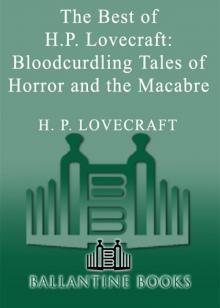 The Best of H.P. Lovecraft
The Best of H.P. Lovecraft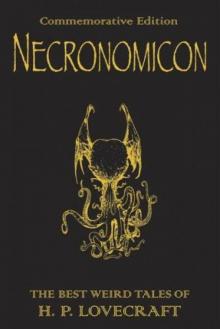 The Definitive H.P. Lovecraft: 67 Tales Of Horror In One Volume
The Definitive H.P. Lovecraft: 67 Tales Of Horror In One Volume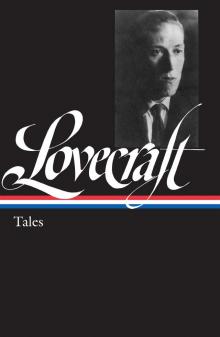 The Complete Works of H.P. Lovecraft
The Complete Works of H.P. Lovecraft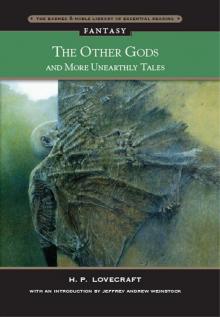 Other Gods and More Unearthly Tales
Other Gods and More Unearthly Tales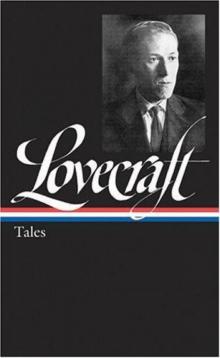 Lovecraft's Fiction Volume I, 1905-1925
Lovecraft's Fiction Volume I, 1905-1925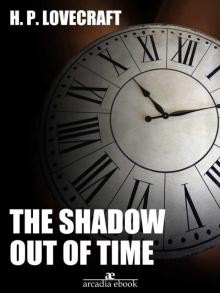 The Shadow Out of Time
The Shadow Out of Time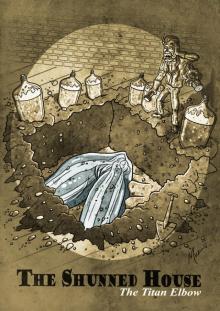 The Shunned House
The Shunned House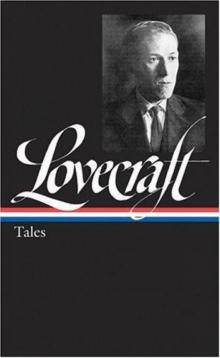 Lovecraft's Fiction Volume II, 1926-1928
Lovecraft's Fiction Volume II, 1926-1928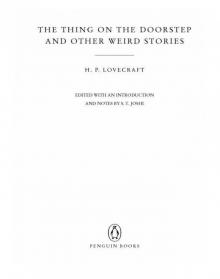 The Thing on the Doorstep and Other Weird Stories
The Thing on the Doorstep and Other Weird Stories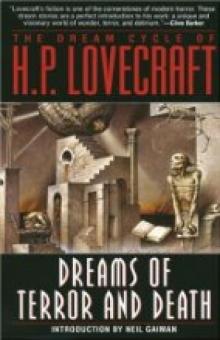 Dream Cycle of H. P. Lovecraft: Dreams of Terror and Death
Dream Cycle of H. P. Lovecraft: Dreams of Terror and Death Great Tales of Horror
Great Tales of Horror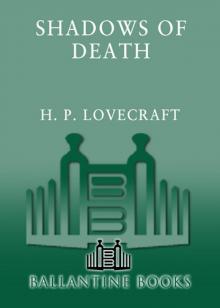 Shadows of Death
Shadows of Death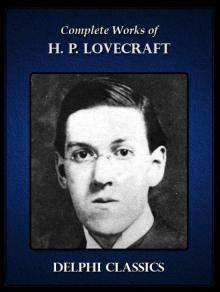 Delphi Complete Works of H. P. Lovecraft (Illustrated)
Delphi Complete Works of H. P. Lovecraft (Illustrated) Waking Up Screaming: Haunting Tales of Terror
Waking Up Screaming: Haunting Tales of Terror H.P. Lovecraft Goes to the Movies
H.P. Lovecraft Goes to the Movies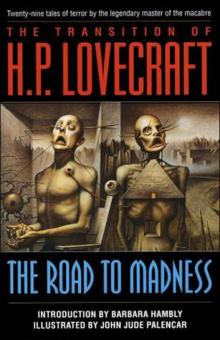 The Road to Madness
The Road to Madness The Complete H.P. Lovecraft Reader (68 Stories)
The Complete H.P. Lovecraft Reader (68 Stories)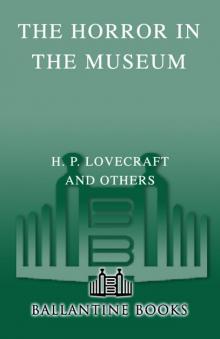 The Horror in the Museum
The Horror in the Museum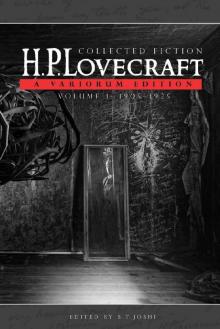 Collected Fiction Volume 1 (1905-1925): A Variorum Edition
Collected Fiction Volume 1 (1905-1925): A Variorum Edition Lovecrafts_Fiction, vol.I_1905-1925
Lovecrafts_Fiction, vol.I_1905-1925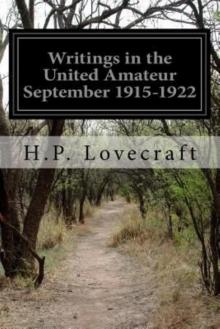 Writings in the United Amateur, 1915-1922
Writings in the United Amateur, 1915-1922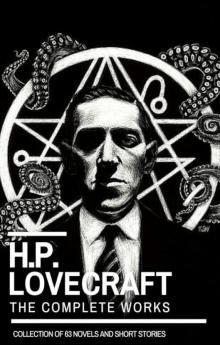 H.P. Lovecraft: The Complete Works
H.P. Lovecraft: The Complete Works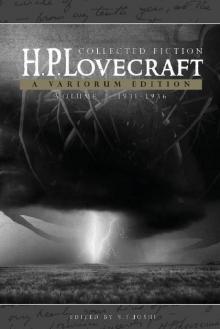 Collected Fiction Volume 3 (1931-1936): A Variorum Edition
Collected Fiction Volume 3 (1931-1936): A Variorum Edition H.P. Lovecraft: The Complete Fiction
H.P. Lovecraft: The Complete Fiction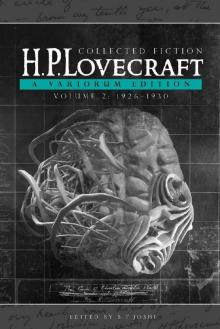 Collected Fiction Volume 2 (1926-1930): A Variorum Edition
Collected Fiction Volume 2 (1926-1930): A Variorum Edition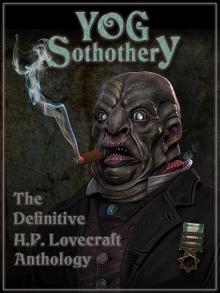 Yog Sothothery - The Definitive H.P. Lovecraft Anthology
Yog Sothothery - The Definitive H.P. Lovecraft Anthology The Complete H.P. Lovecraft Collection (Xist Classics)
The Complete H.P. Lovecraft Collection (Xist Classics)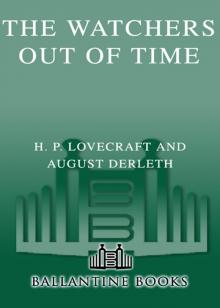 The Watchers Out of Time
The Watchers Out of Time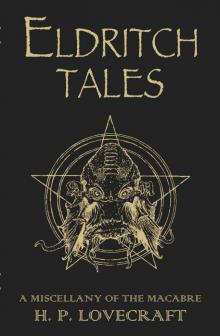 Eldritch Tales
Eldritch Tales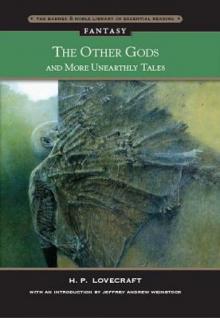 The Other Gods And More Unearthly Tales
The Other Gods And More Unearthly Tales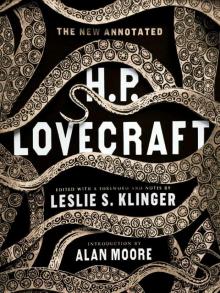 The New Annotated H. P. Lovecraft
The New Annotated H. P. Lovecraft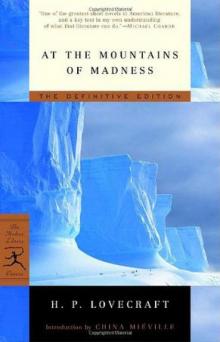 At the mountains of madness
At the mountains of madness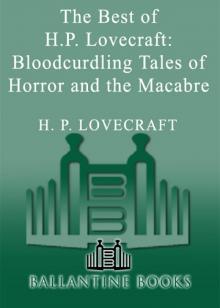 Bloodcurdling Tales of Horror and the Macabre
Bloodcurdling Tales of Horror and the Macabre Fossil Lake II: The Refossiling
Fossil Lake II: The Refossiling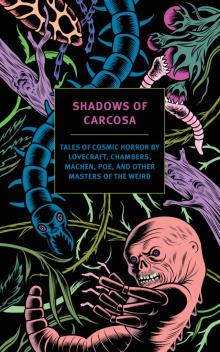 Shadows of Carcosa: Tales of Cosmic Horror by Lovecraft, Chambers, Machen, Poe, and Other Masters of the Weird
Shadows of Carcosa: Tales of Cosmic Horror by Lovecraft, Chambers, Machen, Poe, and Other Masters of the Weird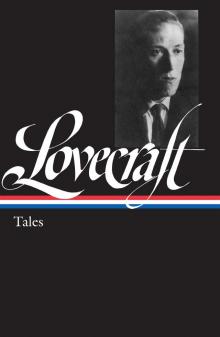 H. P. Lovecraft
H. P. Lovecraft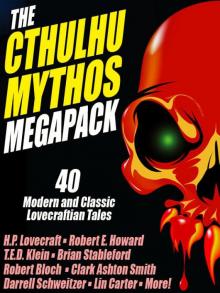 The Cthulhu Mythos Megapack
The Cthulhu Mythos Megapack The Complete H. P. Lovecraft Reader (2nd Edition)
The Complete H. P. Lovecraft Reader (2nd Edition) The Complete Fiction
The Complete Fiction Waking Up Screaming
Waking Up Screaming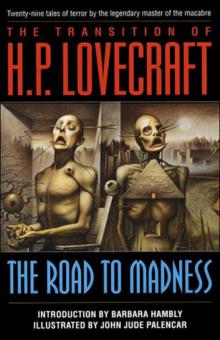 Transition of H. P. Lovecraft
Transition of H. P. Lovecraft![[1935] The Shadow Out of Time Read online](http://i1.bookreadfree.com/i2/04/12/1935_the_shadow_out_of_time_preview.jpg) [1935] The Shadow Out of Time
[1935] The Shadow Out of Time The Horror Megapack
The Horror Megapack